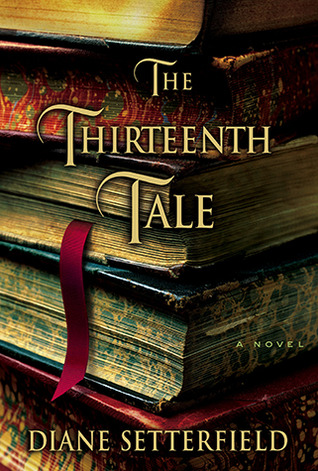
I borrowed this book from the library, after seeing it pop up several times on lists for book lovers which shouldn't be missed.
Genre: General market, mystery, Gothic contemporary.
Biographer Margaret Lea returns one night to her apartment above her father’s antiquarian bookshop. On her steps she finds a letter. It is a hand-written request from one of Britain’s most prolific and well-loved novelists. Vida Winter, gravely ill, wants to recount her life story before it is too late, and she wants Margaret to be the one to capture her history. The request takes Margaret by surprise — she doesn’t know the author, nor has she read any of Miss Winter’s dozens of novels.
Late one night while pondering whether to accept the task of recording Miss Winter’s personal story, Margaret begins to read her father’s rare copy of Miss Winter’s Thirteen Tales of Change and Desperation. She is spellbound by the stories and confused when she realizes the book only contains twelve stories. Where is the thirteenth tale? Intrigued, Margaret agrees to meet Miss Winter and act as her biographer.
As Vida Winter unfolds her story, she shares with Margaret the dark family secrets that she has long kept hidden as she remembers her days at Angelfield, the now burnt-out estate that was her childhood home. Margaret carefully records Miss Winter’s account and finds herself more and more deeply immersed in the strange and troubling story.
Both women will have to confront their pasts and the weight of family secrets... and the ghosts that haunt them still.
MY THOUGHTS:
Miss Vida Winter is a famous novelist who has always kept quiet about her past, although journalists have been pleading for the chance to find out. Toward the end of her life, she contacts a quiet young woman, Margaret Lea, to write her biography, and promises that this time, she will tell the truth.
The Bronte sisters and their classics were referred to so many times in this novel, it gave the impression Diane Setterfield was trying to copy their methods in her story, and it wasn't subtle. She used the same flashback method of Wuthering Heights, with Vida Winter narrating the story to Margaret Lea, but it fell way short. The characters from her previous generations were quickly summed up as beasts and monsters, acting on their animal instincts without a glimmer of human kindness. Instead of being shown their points of view, we're merely told by Miss Winter, 'she was eccentric', or 'he was thick.' When every main character is a bit feral and wooden, it's hard to maintain the interest level to keep reading.
Take Charlie for example. He has a pivotal role in the story, but Setterfield treats him like a prop. Never once do we get a glimpse into his psyche, to see if we can understand what makes him tick. We're merely told about his weird, incestuous fixation, and then he stomps around, grunting like a mountain troll until his part is done. If he was supposed to come across like some tragic Hindley Earnshaw sort of figure, she could have at least given the guy some lines.
I guess Margaret was meant to be our identification character, but her own obsession got a bit old. She never even knew she lost a twin at birth until she was ten years old, but once she found out, her life instantly became a tragedy in her own eyes. She started her cycle of, 'Now I realise she was the one person I can't possibly function without,' when she'd been doing fine to that point. Then all her sensing of ghosts, faint spells and morbid, introspective behaviour took hold, and never stopped. Yes, it was a terrible thing to have happened the day she was born, but when an event is over and done with, you can't even remember it personally, and nothing can be done to change it, you move on! Not Margaret though. Have you ever been irritated by a person who keeps insisting that you wallow with them in some long-ago grief? That was how it felt, to the point that it was a relief to turn the last page and be finished with her histrionics.
The mystery itself is sort of cleverly written, although Margaret pieced it together with not much to go on. The twist was unforeseeable, but at that stage, I'd guessed the whole story was leading to something shocking and over the top, so I would have been more surprised if it wasn't as far-fetched as it turned out to be. There was also plenty of description of sickening, macabre detail which didn't seem integral to the plot, but merely there for shock value.
I did find some characters were okay, such as Hester, John the Dig and Aurelius, (the more normal characters in the book), but they weren't strong enough to save it for me. I couldn't shake the feeling that the whole tale was playing out like some melodramatic, B-grade movie almost the whole time I was reading. 'Anyone who loves books will love this book,' I kept reading over and over. It just goes to show that hype doesn't always measure up.
2 stars

No comments:
Post a Comment